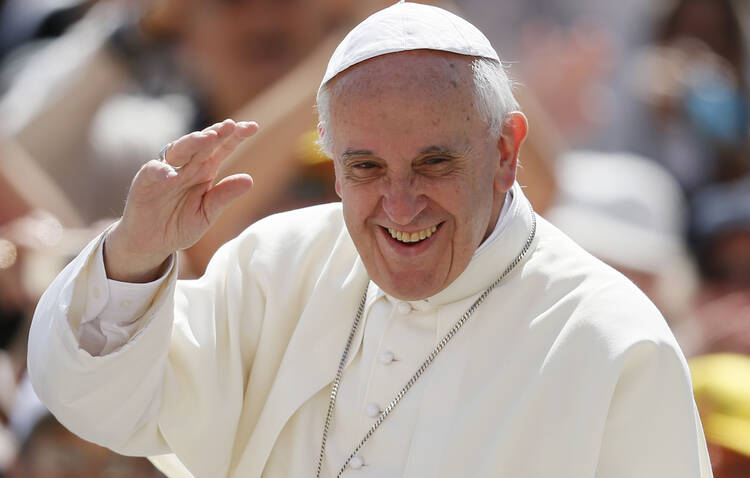The first encylical from Pope Francis, Lumen Fidei, was released today in Rome. The full text can be read here. Here the editors of America offer some notable selections:
Faith is born of an encounter with the living God who calls us and reveals his love, a love which precedes us and upon which we can lean for security and for building our lives. Transformed by this love, we gain fresh vision, new eyes to see; we realize that it contains a great promise of fulfilment, and that a vision of the future opens up before us. Faith, received from God as a supernatural gift, becomes a light for our way, guiding our journey through time. On the one hand, it is a light coming from the past, the light of the foundational memory of the life of Jesus which revealed his perfectly trustworthy love, a love capable of triumphing over death. Yet since Christ has risen and draws us beyond death, faith is also a light coming from the future and opening before us vast horizons which guide us beyond our isolated selves towards the breadth of communion. We come to see that faith does not dwell in shadow and gloom; it is a light for our darkness. Dante, in the Divine Comedy, after professing his faith to Saint Peter, describes that light as a “spark, which then becomes a burning flame and like a heavenly star within me glimmers”.It is this light of faith that I would now like to consider, so that it can grow and enlighten the present, becoming a star to brighten the horizon of our journey at a time when mankind is particularly in need of light (No.1).
Faith opens the way before us and accompanies our steps through time. Hence, if we want to understand what faith is, we need to follow the route it has taken, the path trodden by believers, as witnessed first in the Old Testament. Here a unique place belongs to Abraham, our father in faith. Something disturbing takes place in his life: God speaks to him; he reveals himself as a God who speaks and calls his name. Faith is linked to hearing. Abraham does not see God, but hears his voice. Faith thus takes on a personal aspect. God is not the god of a particular place, or a deity linked to specific sacred time, but the God of a person, the God of Abraham, Isaac and Jacob, capable of interacting with man and establishing a covenant with him. Faith is our response to a word which engages us personally, to a “Thou” who calls us by name (No. 8).
This fullness which Jesus brings to faith has another decisive aspect. In faith, Christ is not simply the one in whom we believe, the supreme manifestation of God’s love; he is also the one with whom we are united precisely in order to believe. Faith does not merely gaze at Jesus, but sees things as Jesus himself sees them, with his own eyes: it is a participation in his way of seeing. In many areas in our lives we trust others who know more than we do. We trust the architect who builds our home, the pharmacist who gives us medicine for healing, the lawyer who defends us in court. We also need someone trustworthy and knowledgeable where God is concerned. Jesus, the Son of God, is the one who makes God known to us (cf. Jn 1:18). Christ’s life, his way of knowing the Father and living in complete and constant relationship with him, opens up new and inviting vistas for human experience. Saint John brings out the importance of a personal relationship with Jesus for our faith by using various forms of the verb “to believe” (No. 18).
The explanation of the connection between faith and certainty put forward by the philosopher Ludwig Wittgenstein is well known. For Wittgenstein, believing can be compared to the experience of falling in love: it is something subjective which cannot be proposed as a truth valid for everyone.Indeed, most people nowadays would not consider love as related in any way to truth. Love is seen as an experience associated with the world of fleeting emotions, no longer with truth. But is this an adequate description of love? Love cannot be reduced to an ephemeral emotion. True, it engages our affectivity, but in order to open it to the beloved and thus to blaze a trail leading away from self-centredness and towards another person, in order to build a lasting relationship; love aims at union with the beloved. Here we begin to see how love requires truth. Only to the extent that love is grounded in truth can it endure over time, can it transcend the passing moment and be sufficiently solid to sustain a shared journey. If love is not tied to truth, it falls prey to fickle emotions and cannot stand the test of time. True love, on the other hand, unifies all the elements of our person and becomes a new light pointing the way to a great and fulfilled life. Without truth, love is incapable of establishing a firm bond; it cannot liberate our isolated ego or redeem it from the fleeting moment in order to create life and bear fruit. If love needs truth, truth also needs love. Love and truth are inseparable. Without love, truth becomes cold, impersonal and oppressive for people’s day-to-day lives. The truth we seek, the truth that gives meaning to our journey through life, enlightens us whenever we are touched by love. One who loves realizes that love is an experience of truth, that it opens our eyes to see reality in a new way, in union with the beloved. In this sense, Saint Gregory the Great could write that “amor ipse notitia est ”, love is itself a kind of knowledge possessed of its own logic.It is a relational way of viewing the world, which then becomes a form of shared knowledge, vision through the eyes of another and a shared vision of all that exists. William of Saint-Thierry, in the Middle Ages, follows this tradition when he comments on the verse of the Song of Songs where the lover says to the beloved, “Your eyes are doves” (Song 1:15).21 The two eyes, says William, are faith-filled reason and love, which then become one in rising to the contemplation of God, when our understanding becomes “an understanding of enlightened love” (No. 27).
Because faith is a way, it also has to do with the lives of those men and women who, though not believers, nonetheless desire to believe and continue to seek. To the extent that they are sincerely open to love and set out with whatever light they can find, they are already, even without knowing it, on the path leading to faith. They strive to act as if God existed, at times because they realize how important he is for finding a sure compass for our life in common or because they experience a desire for light amid darkness, but also because in perceiving life’s grandeur and beauty they intuit that the presence of God would make it all the more beautiful. Saint Irenaeus of Lyons tells how Abraham, before hearing God’s voice, had already sought him “in the ardent desire of his heart” and “went throughout the whole world, asking himself where God was to be found”, until “God had pity on him who, all alone, had sought him in silence.” Anyone who sets off on the path of doing good to others is already drawing near to God, is already sustained by his help, for it is characteristic of the divine light to brighten our eyes whenever we walk towards the fullness of love (No. 35).
It is impossible to believe on our own. Faith is not simply an individual decision which takes place in the depths of the believer’s heart, nor a completely private relationship between the “I” of the believer and the divine “Thou”, between an autonomous subject and God. By its very nature, faith is open to the “We” of the Church; it always takes place within her communion. We are reminded of this by the dialogical format of the creed used in the baptismal liturgy. Our belief is expressed in response to an invitation, to a word which must be heard and which is not my own; it exists as part of a dialogue and cannot be merely a profession originating in an individual. We can respond in the singular — “I believe” — only because we are part of a greater fellowship, only because we also say “We believe”. This openness to the ecclesial “We” reflects the openness of God’s own love, which is not only a relationship between the Father and the Son, between an “I” and a “Thou”, but is also, in the Spirit, a “We”, a communion of persons. Here we see why those who believe are never alone, and why faith tends to spread, as it invites others to share in its joy. Those who receive faith discover that their horizons expand as new and enriching relationships come to life. Tertullian puts this well when he describes the catechumens who, “after the cleansing which gives new birth” are welcomed into the house of their mother and, as part of a new family, pray the Our Father together with their brothers and sisters (No. 39).
Precisely because it is linked to love (cf. Gal 5:6), the light of faith is concretely placed at the service of justice, law and peace. Faith is born of an encounter with God’s primordial love, wherein the meaning and goodness of our life become evident; our life is illumined to the extent that it enters into the space opened by that love, to the extent that it becomes, in other words, a path and praxis leading to the fullness of love. The light of faith is capable of enhancing the richness of human relations, their ability to endure, to be trustworthy, to enrich our life together. Faith does not draw us away from the world or prove irrelevant to the concrete concerns of the men and women of our time. Without a love which is trustworthy, nothing could truly keep men and women united. Human unity would be conceivable only on the basis of utility, on a calculus of conflicting interests or on fear, but not on the goodness of living together, not on the joy which the mere presence of others can give. Faith makes us appreciate the architecture of human relationships because it grasps their ultimate foundation and definitive destiny in God, in his love, and thus sheds light on the art of building; as such it becomes a service to the common good. Faith is truly a good for everyone; it is a common good. Its light does not simply brighten the interior of the Church, nor does it serve solely to build an eternal city in the hereafter; it helps us build our societies in such a way that they can journey towards a future of hope. The Letter to the Hebrews offers an example in this regard when it names, among the men and women of faith, Samuel and David, whose faith enabled them to “administer justice” (Heb 11:33). This expression refers to their justice in governance, to that wisdom which brings peace to the people (cf. 1 Sam 12:3-5; 2 Sam 8:15). The hands of faith are raised up to heaven, even as they go about building in charity a city based on relationships in which the love of God is laid as a foundation (No. 51).








